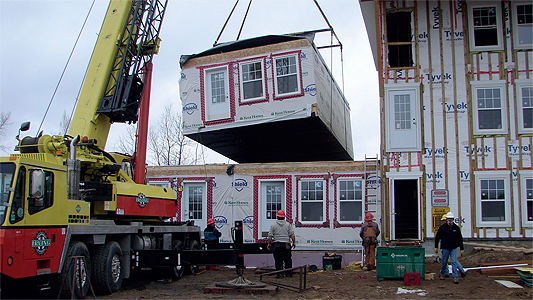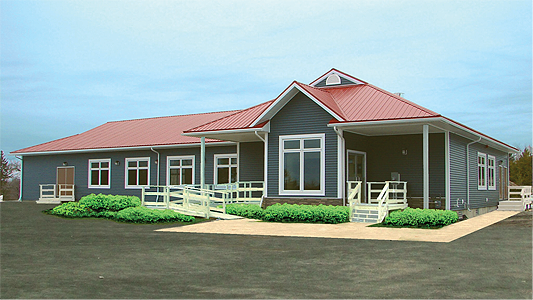Fabricating the future
As the Modular Building Institute reports, modular manufacturing in Canada continues to grow
The commercial modular construction industry in Canada has been growing steadily for years, with both key industry sectors – permanent modular construction and relocatable (or portable) buildings – showing gains. In 2019, for example, increases were driven by new education starts (up 11.5 per cent), office construction nearly doubling, and new multifamily starts (up 13.6 per cent). New multi-family projects made up over half of all new construction opportunities in these  key markets.
key markets.
As the world’s largest international nonprofit trade association serving the commercial modular construction industry, the Modular Building Institute (MBI) represents hundreds of companies around the globe. Over 60 of those companies are based in Canada, including dozens of modular manufacturers.
For this article, we talked with two of MBI’s Canadian manufacturers, Corner-Cast, Inc. and Kent Homes, about current projects, how they’ve been affected by Covid-19, and about their experience in the modular construction industry.
Corner Cast
René Bernaert is COO and co-founder of Corner Cast, a modular company specializing in the design, engineering & prefabrication of modular steel structures for all types of industrial and commercial projects.
“Right now, we’re working on several projects. We’re building a two story, multi-functional building for the Port of Sept Iles,” said Bernaert. “This facility combines a heavy-vehicle maintenance garage and the ports’ administration staff all under one roof. We are also in the process of delivering two pre-fabricated maintenance garages for a total of 15,240 sq/ft for a mine in Suriname, all shipped by train and maritime vessel to site. We recently also began working with the University of Manitoba on an atmospheric testing center for the Canadian Arctic which will help to study climate change.”
Kent Homes
Ray Girouard is the Director of Commercial Sales at Kent Homes. Kent Homes has divisions that cover the residential and commercial sides of modular construction, including both permanent and relocatable buildings.
“Our team has worked on several recent education infrastructure projects,” said Girouard. “We are proud to supply solutions to schools trying to implement new programs and procedures rapidly throughout our communities. Our most recent project is for the Halifax Regional Centre for Education building mobile classroom spaces that can easily be moved to support changing needs from school to school.”
Modular building during Covid-19
Despite the steady industry growth, the arrival of Covid-19 and its implications meant change for everyone.
“Covid-19 has affected our business in some major ways,” said Girouard. “On a sales side, we saw the types of products we are being asked to provide (related to social distancing and Covid-19 testing) change overnight. We are being asked to help design and provide solutions on products and product uses that may not have been considered before Covid-19. On the flip side, we are seeing significant delays in major projects that might have been planned due to pauses in schedules related to the pandemic.
“We are also working with various clients designing facilities and buildings to help in responding to the Covid-19 pandemic. The needs are diverse but modular construction is being discussed for mobile medical units, additional classrooms, employee screening units and more. We are also seeing our rental spaces being employed throughout businesses as they quickly adapt to protect and socially distance employees needing larger such as lunch areas, offices spaces, and employee screening areas.”
Bernaert’s experience at Corner Cast was much the same. “On the production and delivery side, we have encountered delays due to the government imposed shut down which has affected project timelines. In terms of sales, we have surprisingly seen increased demand, due to the reduced labor presence required by our prefabricated system on site.
“We had to adapt our internal processes to be able to work from home for the engineering and design teams, mainly in the way we review and exchange information. The small-talk next to the coffee machine and our open-office concept suddenly turned out to be more impactful than we thought, and we had to find ways to replace that ability to interact.”
The modular industry in Canada
Though it only represents a small minority of the overall construction market share, modular construction is gaining ground – particularly in Canada because of its wide variety of applications and measurable benefits.
“General contractors are feeling the pressure of labor shortages and schedule slippage,” said Girouard. “Modular construction allows GCs to do more with less labor on site. We see more and more interest from clients who never considered modular construction in the past. I see this continuing as the clients learn more about our schedule certainty, quality control, speed to completion and the lower environmental impacts we bring to their projects.”
Bernaert spoke to a similar point. “Using modular construction provides a large advantage for the many remote locations we have in Canada, where local labor is scarce and the construction season is short due to harsh winters. Because of these factors, Canada has many modular providers that work together to help the industry grow. As an industry, we have also been encouraged by the relatively weak Canadian dollar which has made our products competitive when exported to other countries.”
Benefits of MBI Membership
Both Kent and Corner Cast have been members of MBI for over five years and have realized many of the benefits of membership – especially during the past several months.
“The biggest benefit has been the networking,” said Girouard. “The opportunity to discuss various aspects of the industry with other modular professionals. Learning what other modular companies are doing and adapting those industry learnings to provide better products and services to our customers.”
Besides offering networking opportunities and business leads, Bernaert was quick to point out another recent benefit of MBI membership.
“Lately,” said Bernaert, “the peer sharing of Covid measures and standard practices in our factories helped us to adapt to the new Covid environment quickly.”
The Modular Building Institute is the world’s largest international trade association serving modular construction. Members are manufacturers, contractors, and dealers in two distinct segments of the industry – permanent modular construction (PMC) and relocatable buildings (RB). Associate members are companies supplying building components, services, and financing. MBI strives to keep up with the latest trends of the modular/offsite construction industry and has expanded its membership over the years to include architects, owner/developers, and general contractors.
https://www.modular.org